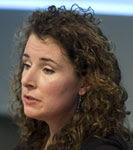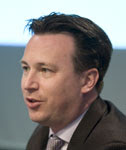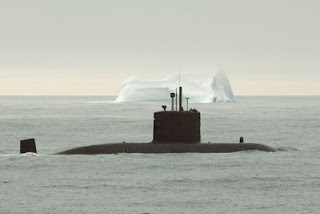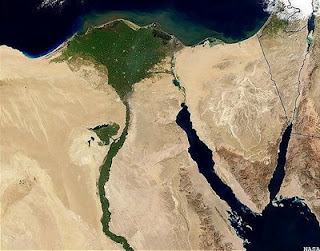-
In Dealing with Climate Change, A Role for Global Governance
›April 14, 2009 // By Will Rogers “The idea of being a citizen of the world is still controversial,” said Strobe Talbott at a March 12, 2009, event examining the “great experiment” of global governance. Nevertheless, Talbott, president of The Brookings Institution, argued that global governance will be key to solving three of the greatest challenges the world faces: nuclear proliferation, climate change, and the financial crisis. This event was co-sponsored by the Wilson Center’s Environmental Change and Security Program and the Environmental Film Festival in the Nation’s Capital.
“The idea of being a citizen of the world is still controversial,” said Strobe Talbott at a March 12, 2009, event examining the “great experiment” of global governance. Nevertheless, Talbott, president of The Brookings Institution, argued that global governance will be key to solving three of the greatest challenges the world faces: nuclear proliferation, climate change, and the financial crisis. This event was co-sponsored by the Wilson Center’s Environmental Change and Security Program and the Environmental Film Festival in the Nation’s Capital.
From Imperialism to Internationalism: The “Great Experiment” of Global Governance
“Bad news has often been the mother of good news” in the long history of global governance, Talbott said. Imperialism “brought fractious tribes and cultures together under a single authority—an attempt at global governance that ultimately failed.”
In the wake of World War I’s destruction came the League of Nations, a stab at global governance that lacked American support and “failed abysmally at preventing the Second World War,” Talbott noted. World War II spawned the United Nations, which was more successful due to the United States’ participation and influence.
From the ashes of the Cold War rose a more interconnected Europe, which Talbott affectionately referred to as the “Euro-mess”—a “system in which multiple countries make common cause in the face of common challenges,” he said. “Part of what we must hope for in the years ahead is the emergence of a more robust ‘globo-mess’—the creation and strengthening of regional and global organizations.”
Global Governance for Global Challenges
According to Talbott, the nuclear arms control treaties exemplify effective global governance in the pursuit of the ultimate common goal: the survival of the human race. “We need to build on past experiences and existing institutions to address challenges like climate change and financial regulation,” he said.
Talbott suggested that we use the existing nuclear nonproliferation regime to build an effective climate control system that ensures that “civilian nuclear power—which we are going to be seeing a lot more of—will be safe and confined to peaceful purposes.”
Similarly, a global financial regime could help bolster the effectiveness of a climate regime by stabilizing the world’s credit markets, enabling them to help “finance commercially viable technologies to end our dependence on fossil fuel,” Talbott said. “If we’re going to have efficient, equitable markets in which to trade in carbon allotments,” we will need a robust global economic regime, as well, he said.
With global governance, “progress has almost always been reactive. But in dealing with climate change, progress needs to be proactive,” as when the world has come together to prevent nuclear war, Talbott said. “If we fail to recognize our own obligations as citizens of the world,” he warned, “we risk, if not our own lives, then the lives of our children and their children.”Photo: Strobe Talbott. Courtesy of Dave Hawxhurst and the Woodrow Wilson Center.
-
VIDEO: Nick Mabey on Climate Change and Security on the Road to Copenhagen
›March 9, 2009 // By Wilson Center StaffThe security community needs to “tell leaders that they won’t be able to guarantee security in a world where we don’t control climate change,” says Nick Mabey in this video from the Environmental Change and Security Program. “Because unless we have the authority of the security establishment and the foreign policy establishment at the table,” he says, “there’s no chance of both delivering the trillions of dollars needed to create a new clean energy economy, but also mak[ing] those tough choices.”
In this short expert analysis, Nick Mabey, founding director and chief executive of E3G, discusses why security must be at the heart of the upcoming Copenhagen Agreement on Climate Change. -
Mind the Gap: Forging a Consensus on Security and Climate Change in EU and US Foreign Policy
›March 5, 2009 // By Will Rogers “There are political and economic vulnerabilities that are in fact more important—or seem more important—to the participants of conflict than the physical vulnerability to climate change,” said Clionadh Raleigh at the February 19, 2009, event, “Climate Security Roundtable: U.S. and EU Research and Policy.” Raleigh, a lecturer at Trinity College Dublin, was joined by Nick Mabey, founding director and chief executive of E3G, and Sharon Burke, a senior fellow at the Center for a New American Security, to discuss climate change’s impact on conflict and how the United States and European Union (EU) have begun to adapt their foreign and security policies to the threat of climate change.
“There are political and economic vulnerabilities that are in fact more important—or seem more important—to the participants of conflict than the physical vulnerability to climate change,” said Clionadh Raleigh at the February 19, 2009, event, “Climate Security Roundtable: U.S. and EU Research and Policy.” Raleigh, a lecturer at Trinity College Dublin, was joined by Nick Mabey, founding director and chief executive of E3G, and Sharon Burke, a senior fellow at the Center for a New American Security, to discuss climate change’s impact on conflict and how the United States and European Union (EU) have begun to adapt their foreign and security policies to the threat of climate change.
Ecological Change, Migration, and Conflict: A Complex Story
“The lack of access to power for certain communities, certain ethnic groups in sub-Saharan Africa, and basic access to resources among the most vulnerable populations has led to people misinterpreting the relationship that ecological change plays in their decision to either participate in conflict or to migrate,” Raleigh said. Although Raleigh’s research, which examined civil conflicts from 1990 to 2004, found that population density and growth were related to higher risks of conflict, “environmental pressures were not more likely to cause conflict in poor states—and not more likely during periods of instability,” she concluded. “Social, political, and economic factors are the most important determinants of civil war within developing countries,” she emphasized. “Poverty and unequal development come up time and time again.”
According to Raleigh, fears of mass international migration in response to climate change are overplayed. “Individuals and communities have quite a lot of coping mechanisms to deal with ecological difficulty,” including migration from rural to urban areas in the same country, she explained. Most migration, including labor and distress migration, “is temporary, internal, and circular,” she emphasized. “There is very little to no evidence that there will be an increase in international migration” in response to ecological change, although “there is evidence that there will be an increase in internal migration.”
Climate Change and Security: Perspectives from the EU “Climate change is serious,” emphasized Mabey. “It’s a threat multiplier, it will make unstable places less stable—it’s going to change strategic interests, alliances, borders, threats, economic relationships, comparative advantages, the nature of international relations, and the legitimacy of the UN.” In the future, “security policy will need to get more preventive and risk-based because climate change just injects a huge bolt of uncertainty into the future,” said Mabey. He urged the expansion of forward-looking information systems that provide policymakers with the data they need to make decisions at the geopolitical, strategic, and operations levels. He also said security experts should strive to communicate the potential consequences of climate change to decisionmakers.
“Climate change is serious,” emphasized Mabey. “It’s a threat multiplier, it will make unstable places less stable—it’s going to change strategic interests, alliances, borders, threats, economic relationships, comparative advantages, the nature of international relations, and the legitimacy of the UN.” In the future, “security policy will need to get more preventive and risk-based because climate change just injects a huge bolt of uncertainty into the future,” said Mabey. He urged the expansion of forward-looking information systems that provide policymakers with the data they need to make decisions at the geopolitical, strategic, and operations levels. He also said security experts should strive to communicate the potential consequences of climate change to decisionmakers.
The EU has taken steps to integrate climate change into its security strategy; Great Britain, Germany, and Denmark have taken the lead. The Arctic has been a particular focus, with security experts examining trade routes, maritime zones, and new access to resources. Climate change “is not all about instability” in fragile, impoverished states, Mabey explained. “The Arctic is by far the most important climate security issue in the minds of traditional foreign-policy types in Europe.”
Environmental Security Gets a New Tool: The Climate War Game Last year, Burke helped conduct a climate change war game based on a scenario of extreme weather events like droughts, wildfires, and cyclones. “Every country sort of hewed to what you would expect,” said Burke of the high-profile participants from China, India, Europe, and the United States. “The EU team spent the first two hours debating whether they could really be a country; the Indian team instantly came up with a negotiating strategy that sounded cooperative and brilliant but was completely impossible to execute; the Chinese team was, ‘No, we’re not going to do anything unless you pay us’; and the American team was keen to lead, only nobody was following.” One of the key lessons from the game, Burke explained, was that “everything comes down to what China is prepared to do.”
Last year, Burke helped conduct a climate change war game based on a scenario of extreme weather events like droughts, wildfires, and cyclones. “Every country sort of hewed to what you would expect,” said Burke of the high-profile participants from China, India, Europe, and the United States. “The EU team spent the first two hours debating whether they could really be a country; the Indian team instantly came up with a negotiating strategy that sounded cooperative and brilliant but was completely impossible to execute; the Chinese team was, ‘No, we’re not going to do anything unless you pay us’; and the American team was keen to lead, only nobody was following.” One of the key lessons from the game, Burke explained, was that “everything comes down to what China is prepared to do.”
In developing the game, Burke and her colleagues discovered “that there’s a vast poverty of the kinds of information that you need to make decisions.” As Burke explained, policymakers need specific data “to obligate large amounts of money and personnel,” and the game revealed that “policymakers don’t have the information they need to make decisions.”
Photos: From top to bottom, Clionadh Raleigh, Nick Mabey, and Sharon Burke. Courtesy of Dave Hawxhurst and the Woodrow Wilson Center. -
New Director of National Intelligence Assesses Climate, Energy, Food, Water, Health
›February 18, 2009 // By Rachel WeisshaarIn the annual threat assessment he presented last week to the Senate Select Committee on Intelligence, new Director of National Intelligence Dennis Blair named the global economic crisis—not terrorism—the primary near-term threat to U.S. national security, prompting accusations of partisanship from the Washington Times. Yet as the U.S. Naval War College’s Derek Reveron notes, “the economic turmoil of the early 20th century fueled global instability and war,” and today’s economic collapse could strengthen extremists and deprive U.S. allies of the funds they need to deploy troops or increase foreign assistance to vulnerable regions.
Further down the list of potential catastrophes—after terrorism, cybersecurity, and the “arc of instability” that stretches from the Middle East to South Asia—the assessment tackles environmental security threats. The four-page section, which likely draws on sections of the recent National Intelligence Council report Global Trends 2025: A Transformed World, summarizes the interrelated natural-resource and population challenges—including energy, food, water, demography, climate change, and global health—the U.S. intelligence community is tracking.
The world will face mounting resource scarcity, warns Blair. “Access to relatively secure and clean energy sources and management of chronic food and water shortages will assume increasing importance for a growing number of countries. Adding well over a billion people to the world’s population by 2025 will itself put pressure on these vital resources,” he writes.
Drawing on the conclusions of the 2008 National Intelligence Assessment on the impacts of global climate change to 2030, Blair portrays climate change as a variable that could place additional strain on already-stressed agricultural, energy, and water systems: “We assess climate change alone is unlikely to trigger state failure in any state out to 2030, but the impacts will worsen existing problems such as poverty, social tensions, environmental degradation, ineffectual leadership, and weak political institutions.” Direct impacts to the United States include “warming temperatures, changes in precipitation patterns, and possible increases in the severity of storms in the Gulf, increased demand for energy resources, disruptions in US and Arctic infrastructure, and increases in immigration from resource-scarce regions of the world,” writes Blair.
Africa, as usual, is the last of the world’s regions to be analyzed in the assessment. Blair notes that “a shortage of skilled medical personnel, deteriorating health systems, and inadequate budgets to deal with diseases like HIV/AIDS, malaria, and tuberculosis” is threatening stability in sub-Saharan Africa, and explains that agriculture, which he rightly calls “the foundation of most African economies,” is not yet self-sufficient, although some countries have made significant improvements in infrastructure and technology. He highlights ongoing conflicts in the Democratic Republic of the Congo, Nigeria, Sudan, and Somalia as the most serious security challenges in Africa. He fails to note, however, that all four have environmental/natural resource dimensions (see above links for details). -
VIDEO: Kent Butts on Climate Change, Security, and the U.S. Military
›February 5, 2009 // By Wilson Center Staff“Climate change is an important issue that can be addressed by all three elements of the national security equation: defense, diplomacy, and development,” says Kent Butts, in this short expert analysis from the Environmental Change and Security Program. Kent Butts, professor of political-military strategy at the Center for Strategic Leadership, U.S. Army War College, makes the case for considering global climate change a nontraditional threat to security and discusses how the U.S. military is reacting to a changing climate.
-
United States Elevates Arctic to National Security Prerogative
›January 16, 2009 // By Will Rogers “The United States has broad and fundamental national security interests in the Arctic region and is prepared to operate either independently or in conjunction with other states to safeguard these interests,” states National Security Presidential Directive 66 (NSPD-66), issued by President Bush on Monday. NSPD-66 does pay some attention to “softer” Arctic issues, such as environmental protection, international scientific cooperation, and the involvement of the Arctic’s indigenous communities in decisions that affect them. But it still takes a tough stance on access to natural resources, boundary issues, and freedom of the seas/maritime transportation. With the rapid shrinking of Arctic ice caps making the region more accessible, the world is likely to see increased competition between the eight Arctic states—the United States, Canada, Denmark, Finland, Norway, Russia, and Sweden—over territorial claims and natural resources like oil and natural gas.
“The United States has broad and fundamental national security interests in the Arctic region and is prepared to operate either independently or in conjunction with other states to safeguard these interests,” states National Security Presidential Directive 66 (NSPD-66), issued by President Bush on Monday. NSPD-66 does pay some attention to “softer” Arctic issues, such as environmental protection, international scientific cooperation, and the involvement of the Arctic’s indigenous communities in decisions that affect them. But it still takes a tough stance on access to natural resources, boundary issues, and freedom of the seas/maritime transportation. With the rapid shrinking of Arctic ice caps making the region more accessible, the world is likely to see increased competition between the eight Arctic states—the United States, Canada, Denmark, Finland, Norway, Russia, and Sweden—over territorial claims and natural resources like oil and natural gas.
The opportunity to gain control over nearly a quarter of the world’s untapped oil and natural gas reserves will cause “a recalibration of geo-strategic power,” writes Scott Borgerson, visiting fellow for ocean governance at the Council on Foreign Relations, in the November 2008 issue of the Atlantic. With the world economic crisis slowing the development of alternative energy technologies, energy consumers will continue to be held hostage by volatile oil and natural gas markets, making those with control over these resources strong geopolitical players. Europe receives one-fifth of its natural gas from Russia, which has abundant reserves. And Russia has leveraged these reserves in an effort to slow the pace of former Soviet states’ accession into NATO and the EU.
Sweden and Norway recently forged a new defense relationship to address the rise of Russian power, and Finland, “also spooked by an increasingly assertive Russia,” will likely join the new Nordic defense pact. Among the pressing concerns for the Nordic alliance is to “make plans for what they call the ‘high north’, the energy-rich area that lies between Europe and the North Pole,” writes Edward Lucas in the Economist’s The World in 2009.
If the Nordic states gain significant control of Arctic oil and natural gas reserves, the European balance of power could shift further toward the West, a situation Russia is eager to prevent. Meanwhile, Canada, “alarmed by Russian adventurism in the Arctic,” has also strongly asserted its claims to Arctic sovereignty. “Canada has taken its sovereignty too lightly for too long,” said then-Prime Minister Stephen Harper in 2007. “This government has put a big emphasis on reinforcing, on strengthening our sovereignty in the Arctic.” Denmark, Great Britain, and Iceland, also mindful of the importance of Arctic resources, will likely stake claims to newly discovered resources. With the United States prepared to operate independently—at least according to the outgoing Bush administration—and its Arctic neighbors not likely to back away from their own interests, this once-frozen region could become a political hotspot.Photo: A Canadian naval submarine, the HMCS Corner Brook, patrols in Arctic waters as part of a Canada Command sovereignty operation in the Hudson Strait in August 2007. Courtesy of MCpl Blake Rodgers, Formation Imaging Services, Halifax, Nova Scotia, and flickr user lafrancevi.
-
Egyptian, Sudanese Governments Stall Nile Treaty
›January 16, 2009 // By Rachel Weisshaar Ten years of negotiations over a new pact governing the use of the Nile River have come to a halt, due to Egyptian and Sudanese reluctance to relinquish their near-total control over the distribution of water resources. “The technocrats had worked out all the paper work for a good protocol but the politicians have thrown a clean piece of cloth in the mud,” Professor Afuna Aduula, chair of the Nile Basin Discourse Forum, told IPS News. “Since Egypt must consent to other nations’ use of the Nile’s water, most of the other basin countries have not developed projects that use it extensively. Not surprisingly, over the years other basin countries have contested the validity of these treaties and demanded their revocation to make way for a more equitable system of management,” explains Patricia Kameri-Mbote in “Water, Conflict, and Cooperation: Lessons From the Nile River Basin.” Decreasing water levels in Lake Victoria, the Nile’s source, have also added to upstream countries’ concerns about water allocation.
Ten years of negotiations over a new pact governing the use of the Nile River have come to a halt, due to Egyptian and Sudanese reluctance to relinquish their near-total control over the distribution of water resources. “The technocrats had worked out all the paper work for a good protocol but the politicians have thrown a clean piece of cloth in the mud,” Professor Afuna Aduula, chair of the Nile Basin Discourse Forum, told IPS News. “Since Egypt must consent to other nations’ use of the Nile’s water, most of the other basin countries have not developed projects that use it extensively. Not surprisingly, over the years other basin countries have contested the validity of these treaties and demanded their revocation to make way for a more equitable system of management,” explains Patricia Kameri-Mbote in “Water, Conflict, and Cooperation: Lessons From the Nile River Basin.” Decreasing water levels in Lake Victoria, the Nile’s source, have also added to upstream countries’ concerns about water allocation.
Despite the political tensions between many of the 10 Nile Basin riparians—which also include Burundi, the Democratic Republic of the Congo, Eritrea, Ethiopia, Kenya, Rwanda, Tanzania, and Uganda—and the critical importance of water to agriculture, health, and economic growth, analysts think it is unlikely that tensions over water will lead to war. All 10 countries belong to the Nile Basin Initiative, a ministerial-level body that has conducted the negotiations, as well as other cooperative and confidence-building measures. “While formally framed as a development enterprise, these efforts also implicitly serve as a means to prevent conflict predicated on environmental interdependence,” notes ECSP Director Geoff Dabelko in “An Uncommon Peace: Environment, Development, and the Global Security Agenda.”
Photo: Satellite image of the northern Nile River. Courtesy of Flickr user thevoyager.
-
Natural Gas Standoff Between Russia, Ukraine Brings New Meaning to “Cold War”
›January 15, 2009 // By Rachel WeisshaarAs the dispute between Russia and Ukraine over natural gas pricing and delivery heads into its second week, it has grown into a larger political standoff between the two countries. The Council on Foreign Relations’ Jeffrey Mankoff explains that the “background is a long-running dispute between Russia and Ukraine in terms of gas relationships over two things: One is over the price that Ukraine pays, and the second is over debt that Ukraine owes Russia for gas shipments in the past that it hasn’t paid for. There’s also a political subtext because Ukraine, since 2004, has had a government that is interested in pursuing integration with Euro-Atlantic institutions, including NATO.”
Europe receives one-fifth of its natural gas from Russia; Bulgaria, Slovakia, and other countries in Eastern and Southeast Europe have been particularly hard-hit by the shutdown. Russia and Ukraine agreed to resume natural-gas deliveries to Europe on Monday, but that EU-brokered agreement has fragmented, and the two countries continue to argue over which pipelines to use and how much gas to deliver. Russian Prime Minister Vladimir Putin and Ukranian Prime Minister Yulia Tymoshenko are scheduled to meet at an EU-sponsored summit on Saturday.
Natural resources are frequently involved when Russia makes international headlines. For instance, in August 2008, Russia and Georgia went to war over resource-rich, geopolitically strategic South Ossetia. In addition, in January 2006, Russia and Ukraine got into a similar dispute over natural gas—although that one did not last as long as the present one. It remains to be seen which side—if either—will benefit from the manipulation of natural resources in the current situation.
Showing posts from category foreign policy.


 “The idea of being a citizen of the world is still controversial,” said Strobe Talbott at a March 12, 2009, event examining the “great experiment” of global governance. Nevertheless, Talbott, president of The Brookings Institution, argued that global governance will be key to solving three of the greatest challenges the world faces: nuclear proliferation, climate change, and the financial crisis. This event was co-sponsored by the Wilson Center’s Environmental Change and Security Program and the
“The idea of being a citizen of the world is still controversial,” said Strobe Talbott at a March 12, 2009, event examining the “great experiment” of global governance. Nevertheless, Talbott, president of The Brookings Institution, argued that global governance will be key to solving three of the greatest challenges the world faces: nuclear proliferation, climate change, and the financial crisis. This event was co-sponsored by the Wilson Center’s Environmental Change and Security Program and the  “There are political and economic vulnerabilities that are in fact more important—or seem more important—to the participants of conflict than the physical vulnerability to climate change,” said Clionadh Raleigh at the February 19, 2009, event, “
“There are political and economic vulnerabilities that are in fact more important—or seem more important—to the participants of conflict than the physical vulnerability to climate change,” said Clionadh Raleigh at the February 19, 2009, event, “ “Climate change is serious,” emphasized Mabey. “It’s a threat multiplier, it will make unstable places less stable—it’s going to change strategic interests, alliances, borders, threats, economic relationships, comparative advantages, the nature of international relations, and the legitimacy of the UN.” In the future, “security policy will need to get more preventive and risk-based because climate change just injects a huge bolt of uncertainty into the future,” said Mabey. He urged the expansion of forward-looking information systems that provide policymakers with the data they need to make decisions at the geopolitical, strategic, and operations levels. He also said security experts should strive to communicate the potential consequences of climate change to decisionmakers.
“Climate change is serious,” emphasized Mabey. “It’s a threat multiplier, it will make unstable places less stable—it’s going to change strategic interests, alliances, borders, threats, economic relationships, comparative advantages, the nature of international relations, and the legitimacy of the UN.” In the future, “security policy will need to get more preventive and risk-based because climate change just injects a huge bolt of uncertainty into the future,” said Mabey. He urged the expansion of forward-looking information systems that provide policymakers with the data they need to make decisions at the geopolitical, strategic, and operations levels. He also said security experts should strive to communicate the potential consequences of climate change to decisionmakers. Last year, Burke helped conduct a
Last year, Burke helped conduct a  “The United States has broad and fundamental national security interests in the Arctic region and is prepared to operate either independently or in conjunction with other states to safeguard these interests,” states
“The United States has broad and fundamental national security interests in the Arctic region and is prepared to operate either independently or in conjunction with other states to safeguard these interests,” states  Ten years of negotiations over a new pact governing the use of the Nile River have come to a halt, due to Egyptian and Sudanese reluctance to relinquish their near-total control over the distribution of water resources. “The technocrats had worked out all the paper work for a good protocol but the politicians have thrown a clean piece of cloth in the mud,” Professor Afuna Aduula, chair of the Nile Basin Discourse Forum, told
Ten years of negotiations over a new pact governing the use of the Nile River have come to a halt, due to Egyptian and Sudanese reluctance to relinquish their near-total control over the distribution of water resources. “The technocrats had worked out all the paper work for a good protocol but the politicians have thrown a clean piece of cloth in the mud,” Professor Afuna Aduula, chair of the Nile Basin Discourse Forum, told 

